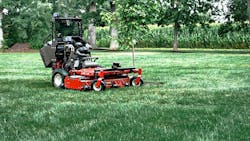Electric Sheep Robotics is looking forward to making a splash as an autonomy partner to the landscaping industry by tackling the same challenge facing just about any industry today—a serious shortage of reliable labor.
The majority of landscape maintenance involves lawn mowing, a tedious and repetitive process made physically grueling by exposure to harsh weather. This exacerbates the industry's labor shortages, low growth, and shrinking margins. The company, founded in 2019, is addressing this challenge with it first offering known as Dexter. Dexter is clamp-on robotic hardware and software capable of turning commercial lawn mowers into self-driving machines.
The robot utilizes cutting-edge technology including LIDAR, cameras, GPS, and ultrasonic sensors for ultra-precise maneuvering across diverse terrain. All robots are monitored while in use and incorporate a safety-rated system capable of detecting perimeter breaches in even the most adverse conditions. They are built to the R15.08 standard for self-driving robots.
Dexter over the air updates, requires minimal training and can mow any type of grass fully autonomously. The company also plans to apply the technology to other turf applications, including snow removal, sweeping, sidewalk repairs, and pest control.
“To our knowledge, we are the only deployed machine that claims (and can) perform 100% of the mowing on a site regardless of obstacle density,” Gunjit Singh, co-founder and chief product officer of Electric Sheep Robotics says. “We can navigate as close to objects as a human whereas our competitors mainly use GPS or camera powered machines that are suitable for open fields/golf courses, but not general-purpose mowing.”
According to Singh, a few fairly difficult technical challenges exist in self-driving mowers that are unique to the field. “In self-driving cars or warehouse robots for instance the machine is not intentionally going close to things, whereas in mowing getting close to objects is necessary - a mower that leaves random clumps of grass uncut is quite useless,” he says. “It’s also unacceptable to collide with things - thus the precision required to know where you are in relation to objects around you is very high - on the order of cm.”
Recognizing the challenges and opportunities
Singh anticipates that gaining momentum and evolving within the landscaping market will be a fairly intense partnership process. “The landscaping industry is too low margin to have ‘innovation budgets’ the way we think of them among normal corporations, so for our pilot partners we stand as guarantors for the work and the schedule,” says Singh. “We expect this handholding will continue for the next 2-3 years. Beyond that, to fully take advantage of autonomous systems, it requires first re-working your workflows and processes and also investing in retaining a more skilled workforce. Which is what I expect landscaping to look like when this process is complete.”
Fortunately, the acuity of the need is so deep and the willingness to try autonomy so intense that we have been overwhelmed by the response, explains Nag Murty, CEO and co-founder of Electric Sheep, in a statement. “If we were to stop acquiring new customers today and just expand among the ones who are signed on with us, we would already have hundreds of millions in annual revenue in a few years.”
Seeing greener pastures
One thing that surprises almost everyone is that there aren’t self-driving mowers already, explains Singh. “People expect the little roomba mowers to work, just scaled up - however that would be an absurd solution, he says. “There is a non-trivial technical challenge to be solved here that was not really solvable 3-4 years ago. It’s only now that the right technology is available at the right price point.”
The team has learned that autonomy is going to be a process of engagement because when the largest part of a workflow is changed, everything else needs to adjust around it. “A lot of industries traditionally thought of as ‘blue collar’ are actually quite open to innovation, it’s just that the innovation needs to materially impact the business,” he says. “Landscapers, for instance, may or may not adopt ‘productivity software’ but that’s because there just isn’t that much time-saving in an operationally intensive bricks and mortar business from just software. However, mention that you can actually free up their staff and lighten their hiring needs and they are all ears.”
Although just now entering the market from stealth mode, the start-up has already raised approximately $4 million in funding led by Foundation Capital, with participation from Grep VC, Signia Ventures, and angels such as Ariel Cohen (TripActions), Travis Deyle (Cobalt Robotics), Sahil Lavingia (GumRoad).
About the Author
Peter Fretty
Managing Editor
As a highly experienced journalist, Peter Fretty regularly covers advances in manufacturing, information technology, and software. He has written thousands of feature articles, cover stories, and white papers for an assortment of trade journals, business publications, and consumer magazines.
